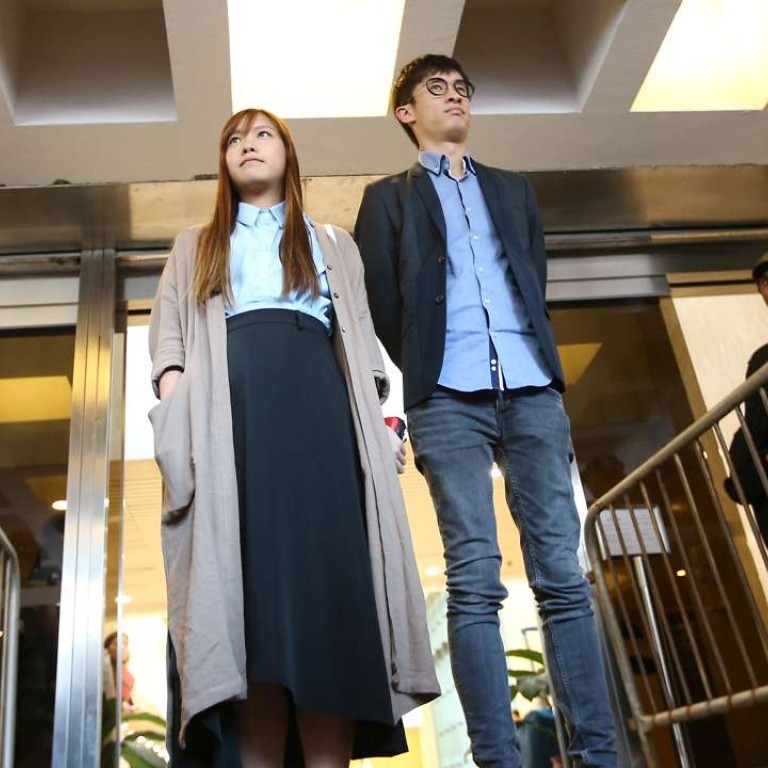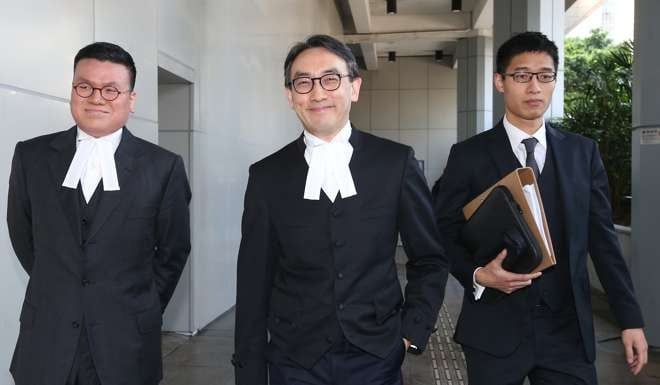
Courting controversy in Hong Kong over the Legislative Council oath-taking fiasco
The bitter controversy over the potential disqualification of localist lawmakers Sixtus Baggio Leung Chung-hang and Yau Wai-ching turned into a full-blown court battle on Thursday, as top lawyers for three parties – the duo, the government and the Legislative Council president – argued their cases.
The day in court not only addressed the specific acts of the Youngspiration pair and how they insulted China, but even turned into an intellectual debate. The lawyers clashed over to what extent the doctrine of separation of powers existed in Hong Kong, and whether and to what extent judges should interfere in the affairs of the legislature.
Despite the case centring on the Basic Law and allegiance to China, English and Australian legal precedents were cited – some dating back to the 17th and 18th centuries.

Benjamin Yu SC, counsel for Chief Executive Leung Chun-ying and Secretary for Justice Rimsky Yuen Kwok-keung:
Interpretation of the Basic Law It is the stance of the Hong Kong government that the issues in question could and should be resolved within the SAR judicial system.
The SAR government did not ask the National People’s Congress Standing Committee to interpret the Basic Law and was seeking confirmation from Beijing about the move reported in the media.
The media reported that a University of Hong Kong academic said in unfounded speculation that because the Hong Kong government had no confidence in the court, it had sought the NPCSC interpretation. That was furthest from the truth.
Oath taking is a constitutional requirement Basic Law Article 104 states that Legco members must, when assuming office, “swear to uphold the Basic Law of the HKSAR of the People’s Republic of China and swear allegiance to the HKSAR of the People’s Republic of China” in accordance with the law.

The requirement of Article 104 was transparently obvious and was a “mandatory constitutional obligation” imposed on all lawmakers-elect. The upholding of the Basic Law and the acceptance of the fact that the HKSAR is an inalienable part of China was fundamental to the person being allowed to assume office.
Section 19 of the Oaths and Declarations Ordinance requires a legislator to take the Legislative Council oath as soon as possible after the start of his term of office. The oath to be taken is prescribed.
Yau Wai-ching and Sixtus Baggio Leung Chung-hang declined or neglected to take the Legco oath There was no doubt that the pair declined or neglected to take the Legco oath after each of them had been “duly requested” to do so. Non-compliance should result in the lawmakers vacating their office under section 21 of the Oaths and Declarations Ordinance.
The constitutional relationship between the HKSAR and China was precisely the focus of deliberate challenge and ridicule by Leung and Yau, who used the term “Hong Kong nation”, deliberately mispronounced China as “Geen-na” or “Shee-na” and displayed a banner bearing the words “Hong Kong is not China”.

Leung also crossed his index and middle fingers, which could only mean, in context, that he was lying or at least was not sincere in taking the oath.
Yau went to the extreme of using an “f” word to replace the word “Republic”. The inevitable inference was she was showing contempt for China, while respect for the country was absolutely fundamental to the “one country, two systems” concept in the Basic Law.
The conduct of Leung and Yau was plainly a rehearsed, calculated and coordinated attempt to advocate Hong Kong’s independence from China.
The Legco president has no right to administer the oath to Leung and Yau a second time The failure of Leung and Yau was not due to any inadvertence, mistake or genuine misunderstanding, so there was no reason whey they should be afforded a further chance to take the oath. If a person declined to take the oath after he was asked to do so, his or her office becomes vacant. If the office is vacated, the president does not have the power to administer the oath again
Should the court follow the principle of non-intervention (in legislative affairs) and separation of powers? The separation of powers enjoyed in Hong Kong is different from that in the US, Australian and British models. In Hong Kong, the Basic Law and not Legco is supreme. The case is not concerned with the internal workings of Legco like filibustering, but Article 104 of the Basic Law. The court has to protect Article 104. The principle of non-intervention cannot override Article 104.
The localists should not be immune from legal action because immunity as provided for by the Basic Law covers only statements, not their oath taking. Their freedom of speech is also not an issue because the question is whether they took the oath properly.
Should the chief executive initiate the legal action or should he rely on the justice secretary as the Legislative Council Ordinance states?
There is a duty under Articles 2 and 48 of the Basic Law for the Hong Kong government to be responsible for the implementation of the Basic Law. The chief executive has a special obligation in ensuring compliance.

Hectar Pun Hei SC for Sixtus Baggio Leung Chung-hang and Philip Dykes SC for Yau Wai-ching
The court has no power to interfere with the Legco president’s decision [1884 UK case in which court refused to interfere with a resolution of the House of Commons that restrained MP Charles Bradlaugh from taking the oath] Yau Wai-ching’s case resembled the facts of the Bradlaugh case in the UK. It is determinative of the issue of privilege and exclusive cognizance.
After MP Charles Bradlaugh had been harried in the courts for presuming to vote when he had not been sworn in, he applied to the speaker of the house to be given the opportunity to take the oath.
Other members objected because in earlier litigation he had made it clear that, as an atheist, he would not regard himself bound by the oath. Members voted to exclude him from the house.
Bradlaugh sought a declaration that his exclusion was unlawful and that the serjeant-at-arms should be restrained from stopping him from returning and taking the oath.
The issue of taking the oath, although a statutory requirement and not just a procedural issue, as in this case, was held to be “a matter relating to the internal management of the procedure of the House of Commons” so that the court “had no power to interfere”.
The judges said “what is said or done within the walls of parliament cannot be inquired into in a court of law. The jurisdiction of the houses over their members is absolute and exclusive. The House of Commons has the exclusive power of interpreting the statute”.
The court should refuse to declare the Legco president’s decision void and to restrain Baggio Leung from taking the Legco oath afresh based on the president’s decision.
Chapter 4 of the Basic Law provides for lawmakers’ immunity from legal action. Article 78, a “neglected” clause in the mini-constitution, provides for their freedom to access the Legco chamber.
The oath-taking acts of the localists, even if considered “misbehaviour” subject to disqualification under Article 79 of the Basic Law, still had to be handled by a Legco procedure.
In many ways non-compliance with legal procedures when making laws under the Basic Law can be regarded as a more weighty constitutional issue than whether the Legco president was right or wrong when he decided to allow Yau Wai-ching another chance to take the oath.
The court should not lose sight of its role The courts will only encroach on matters which would appear to be subject to legislative privilege only in the clearest cases where the court can say with a great degree of confidence that the immunity or privilege had been displaced a Basic Law right.
The government’s interpretation of the Oaths and Declarations Ordinance goes completely against the constitutional grain of the Basic Law.
It would be unimaginable if the court was to look at the merits in each case to decide whether an oath was valid. That will make the judge very busy. That is simply not workable.
There is no question of automatic vacation of a lawmaker’s office A lawmaker has to resign to vacate his office. You have to do something to vacate your office.
The Basic Law provides for a separation of powers The oath-taking controversy should be resolved by the Legislative Council itself through a political process rather than a judicial process. The issue must stay inside Legco.
Chief Executive Leung Chun-ying wrongly put his name on the case The law says only the secretary for justice shall represent the government in court proceedings involving Legco.
The chief executive’s participation in the case meant extra taxpayers’ money would be spent on the matter.
A person suing in his personal capacity made no reference as to whether he was an elector in the constituency ... but [Leung Chun-ying] still sued in the capacity of an elector.
The chief executive lives on Hong Kong Island but Leung and Yau were elected in New Territories East and Kowloon West constituencies respectively.

Jat Sew-tong SC, counsel for Legislative Council president Andrew Leung Kwan-yuen:
Judicial review against the Legco president misconceived The Legco president was not connected with and did not condone the actions of Sixtus Baggio Leung Chung-hang and Yau Wai-ching in their oath-taking. He was unnecessarily brought into the hearing as a respondent, giving the wrong impression that the executive branch intended to exert pressure on the legislature. The government should avoid any action of political sensitivity, but its counsel had yet to address this point.
The Legco president has the power to decide whether to let Leung and Yau retake the oath Article 72 of the Basic Law gives the Legco president the constitutional duty to preside over meetings, decide on the agenda of meetings and exercise other powers as prescribed in the Legco rules of procedure.
“Presiding over meetings” meant he could exercise orderly, fair and proper control over such gatherings, including making the decision on who was allowed to attend, participate in and vote at meetings. It therefore followed that the Legco president had the power to decide whether a member had validly taken the oath and was entitled to attend a meeting.
While the government argued that Leung and Yau had declined to take the oath and therefore should be disqualified under section 21 of the Oaths and Declarations Ordinance, the Legco president should not be concerned with the ordinance because ultimately, he already had a constitutional duty under Article 72 of the Basic Law to make decisions.
Furthermore, it would be a very serious matter to hold under the ordinance that an elected Legco member had vacated his or her office because they declined or neglected their oath.
Irreparable damage might be caused by any decision to disqualify them – not only to the elected members, but also to Legco as a whole and the community at large.
Given the potentially serious consequences that might follow if the Legco president’s decision was found to be wrong [in court], the better course to chart would be to allow them to retake the oath. If they demonstrated by conduct that they were not prepared to take the oath properly once again, the Legco president would then have more solid grounds to decide they had declined to take the oath.
Even if a lawmaker had “become a murderer”, it would still require a two-thirds majority of votes in Legco to disqualify him or her, in accordance with Article 79 of the Basic Law.
Government is self-contradictory It was contradictory for the government’s counsel to assert that the president was not a final arbiter in the matter on the one hand, and still be obliged to make a decision to invalidate the duo’s vows on the other.



